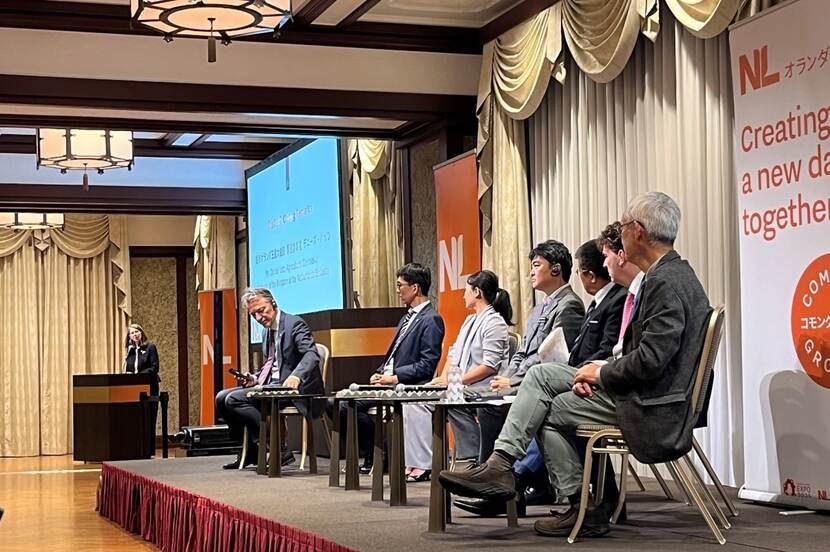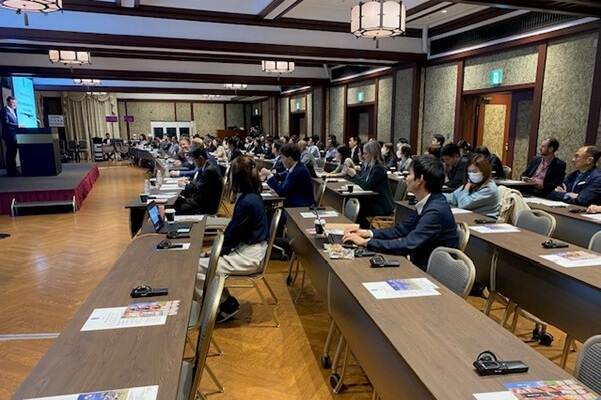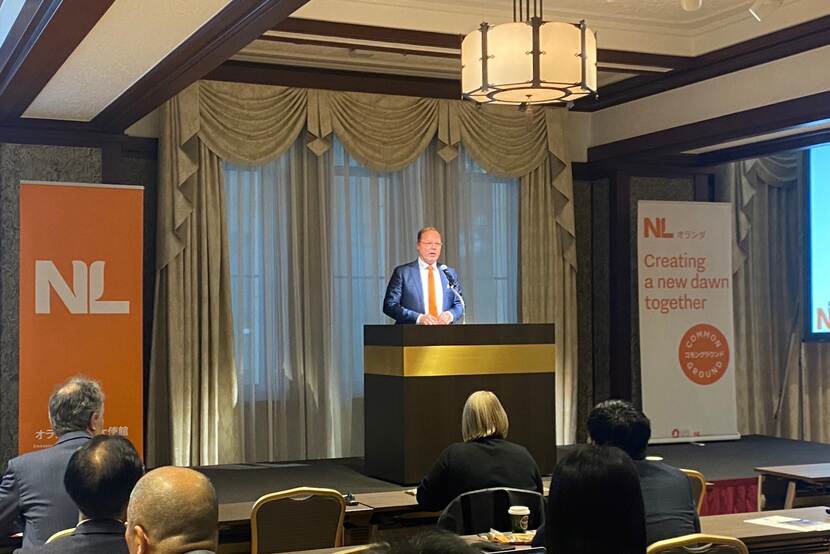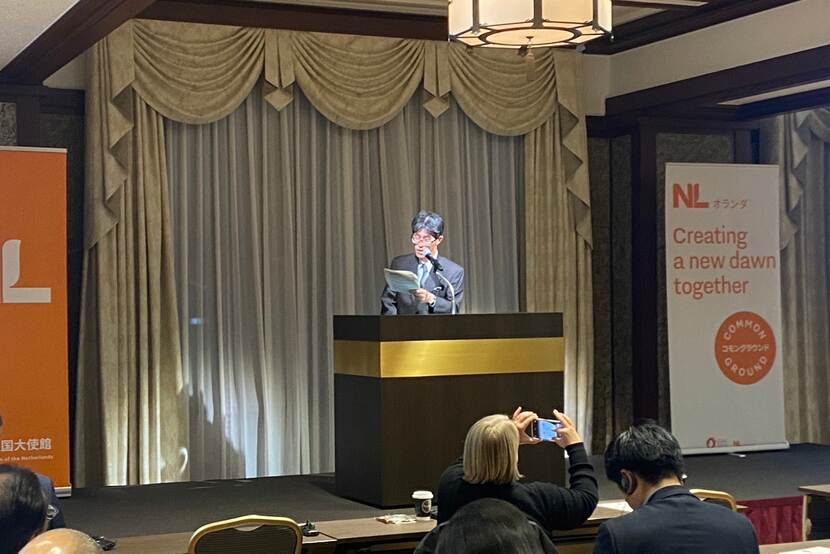Insights on sustainable livestock and meat production in Japan and the Netherlands
At a recent seminar in Tokyo representatives from the Dutch and Japanese meat and livestock industry shared their outlook on sustainable production in both countries. Following their presentations a panel consisting of members from the meat and food industry, trade, finance and media further discussed Japan’s efforts towards sustainable production and animal welfare. While the general consensus was that Japan still has a long way to go compared to Europe, things are slowly changing.
On 22 November 81 representatives of the private sector, universities, government and media gathered at Tokyo’s Kudan Kaikan Terrace for a seminar on sustainable food production (programme with links to presentations) with a focus on the meat and livestock industry. Aim of the seminar was to raise awareness in Japan and build consensus on the need for sustainable meat production, taking into account the whole supply chain including imports.
“With consumption of fish on the decline in Japan, reducing meat consumption and switching to plant-based proteins is not a desirable approach for the overall well-being of the population. – Chisa Ogura.“
After the opening speech delivered by Chargé d’Affaires of the Dutch Embassy in Japan, Theo Peters, the seminar started off with a presentation by Frederik Vossenaar, special envoy at the Ministry of LNV, on the political and social background of sustainable food production in the Netherlands. Mr. Vossenaar focused in particular on the importance attributed to animal welfare in the Netherlands. Dr. Laurens Hoedemaker, Chairman of the Dutch Central Organization for the Meat Industry and President of the European Federation for Meat Production, Meat Trade and Livestock Trade (UECBV), reminded the audience of the increasing global need for animal protein for healthy development and the challenge to focus production in suitable areas with a view to climate change – remarks which clearly resonated with the audience. He then continued to outline the sustainability efforts by the Dutch meat industry, with a focus on decarbonization efforts throughout the supply chain. Finally, Tetsuya Kuroi, Deputy Executive Director of Agriculture & Livestock Industries Corporation (ALIC), gave a comprehensive overview of the challenges and strategies for sustainable livestock production under Japan’s green food system strategy. Given Japan’s food security concerns due to a low self-sufficiency rate and fast ageing farming population Kuroi set out the dual approach of a “Japanese-style sustainable production”: technology and innovation should foster the development of a sustainable meat and livestock production while simultaneously revitalizing Japan’s agriculture sector.
“Japanese consumers do not know much about livestock production. Even students at veterinary schools cannot draw a good picture of a pig. - Tsutomu Tsukada”
After the presentations Vossenaar moderated a lively panel discussion on the progress of, and differences in, sustainable development between Japan and the Netherlands. The panel consisted of Junji Mori of The Norinchukin Bank, Chisa Ogura of Meros Consulting, Kenji Takasaki of NH Foods, Tsutomu Tsukada of the Dutch Agricultural Marketing Board, Masaru Yamada of The Japan Agricultural News and Eric de Jong of VION Food Group.

Like in the Netherlands, the majority of people in Japan are city-dwellers who no longer have any link with farming and to whom the countryside is rather a place for leisure and nostalgia. As a result most Japanese consumers have no clear understanding of what livestock production actually entails. In stark contrast with the Netherlands, however, the panelists pointed out that Japanese consumers are also largely unaware of the environmental impact of agricultural/livestock production, and only 10% of Japanese consumers has ever heard of the words ‘animal welfare’. This may be related to the hitherto absence in Japan of large-scale outbreaks of animal diseases followed by intense media coverage of large-scale culling, but it may also be a kind of thinking that needs more time to take root in Japan. In either case, the panelists agreed that educating and informing Japan’s consumers is needed to raise awareness of issues like animal welfare.
“The most effective approach to have Japanese consumers support sustainable production is to tempt them with delicious high-quality sustainable produced products. – Kenji Takasaki”
The Japanese government promotes the use of carbon credits in agriculture as a stimulus and additional means of income for farmers making decarbonization efforts. It also provides for a (limited) labeling system which allows producers to visualize their efforts to cut back on GHG emissions. Although such labels may help Japanese consumers to make informed choices, translating decarbonization or animal welfare efforts into price was thought to be difficult as consumers still do not grasp the actual issue at stake. On the other hand, European consumers are also not willing to pay a higher price, despite their being relatively better informed. In Europe, however, animal welfare developments are driven by supermarkets and global customers like McDonalds who set animal welfare standards. If companies want to do business with them, they need to comply with their standards. These market operators could – and will - also play a role in Japan, was the expectation of some panel members.
In addition to education, the panel agreed that the way to win Japanese consumers over and have them choose products that have been produced with care for the environment and/or animal welfare, is to make sure these products are delicious and of high quality. Taste and nutrition are the most important factors for consumer acceptance. Innovative ‘premium’ products are also a good strategy, like the alternative product for foie gras developed by NH Foods. This product called “gras foie” is made from chicken liver which would otherwise have been discarded and is particularly popular among the younger generation.

In her closing remarks Agricultural Counsellor Denise Lutz, host of this first edition of a series of seminars on sustainable food production, voiced the hope that although Japanese society at present is less critical of the conditions of its food production and appears even less interested in its remote impacts than Dutch society, the Japanese government and industry will continue taking initiative.
The second edition of this series of seminars next year will focus on sustainable plant production. The series is part of “Common Ground – Road 2 Osaka” activities, organized with a view to the World Expo Osaka 2025 and beyond.

